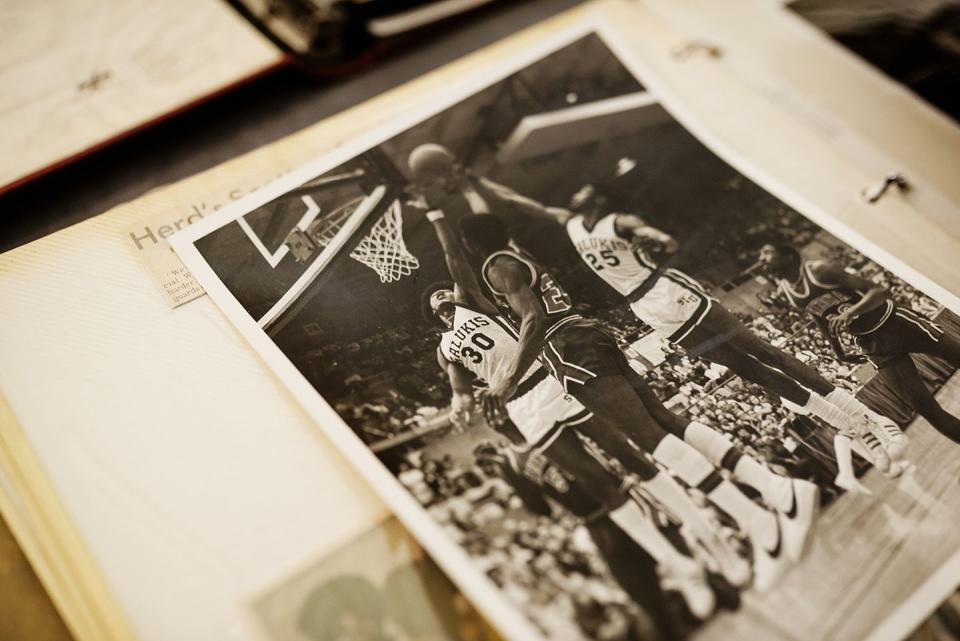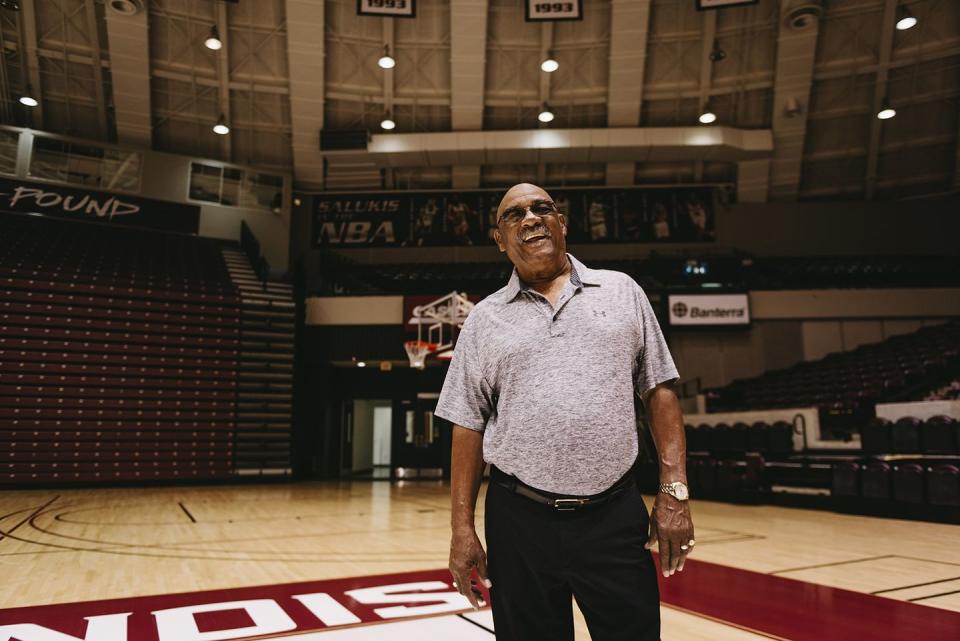Herman Williams Reflects on His Career Coaching Basketball at an All-Black High School

- Oops!Something went wrong.Please try again later.

Interview by Allana Haynes/
Photograph by Joe Martinez
Williams grew up in Birmingham, AL, and was a star athlete. In 1969 he coached the first all-Black high school to the state championship in basketball. He later went on to help recruit Charles Barkley to play at Auburn University.
Allana Haynes: When did you know you wanted to coach?
Herman Williams: I went to Parker High School, in Birmingham. At that time it was one of the largest Black high schools in Alabama, and probably the United States. I had a great mom and dad, but I also had one of the best coaches in the world, Coach Brown. That’s the reason I wanted to be a coach. There was so much trust between him and my teammates.
AH: Did you have a big family?
HW: I had two brothers and two sisters, and we all attended high school at Parker. I was lucky enough to get a football scholarship to Dillard University down in New Orleans, and after I finished Dillard, I went back to Birmingham.
My oldest sister, she finished Miles College and taught in Birmingham for a while before moving to Los Angeles. The youngest sister, she finished Miles College and taught 30 years in Birmingham, and the brothers, one brother finished Miles also, and he ended up in Los Angeles working as a probation officer. And the other brother, he worked at Chrysler in Detroit, but myself, I was always interested in sports, and that’s where I got my break, and I loved it and I enjoyed it until I got out of it.

AH: What else do you remember about Parker?
HW: I went to high school with people like Angela Davis. She was right ahead of me. Her brother and I were in the same class. You’re talking about real people when you talk about that time, where I grew up—people who wanted to succeed.
I’ve gone through a lot, coming up in Alabama—the 16th Street Baptist Church, those sisters who were killed. I’ve been at football games when the police would have German shepherds they would turn loose. That’s the way it was then. So you have to start with an understanding of what we came up through. It was a lot different. The parents that we had and the lessons that we were taught—it was tough times, and you had to believe in what you were doing. You had to believe in your instructors and you had to believe in your community.
AH: Looking back from this age now, are there any lessons that you wish you’d learned sooner?
HW: Well, I think I learned all of it at the right time.
AH: What’s one of the greatest moments in history that you’ve lived through?
HW: A Black president, number one.
But I guess it’s the times that I spent when I was in Alabama coaching. I came through the times of, “Hey, you can’t do this, you can’t do that.” Integration took place when I was coaching high school, and I was lucky enough to coach the first Black high school to a state championship in basketball. It was the first year they had a state tournament with all schools involved. And we did win it all. That was 1969 and then again in 1971.
We played all-Black and all-white high schools. Our school was all-Black, but we played a team at the championship that was a mix of Black and white players. You had a few fights before the game, after the game, during the game—the same thing that happens today—but they were controlled eventually. You had problems then, you still have problems today.
To win any time is great, but to win it all with the students that you have, the athletes that we had—you’re very proud of them. A lot came out of that for me, and for some of my players. The first Black player to get a scholarship to the University of Alabama played on that high school team. The first Black kid to get a scholarship to the University of Alabama—that was a big thing. Wendell Hudson. He made all-everything in the SEC.
AH: Amazing. After success like that, what next?
HW: I was lucky enough to coach at Auburn University. The first year I went there, the coach that I went with, he was killed in a hotel fire. His name was Paul Lambert. The first two weeks we were working at a basketball clinic in Columbus, GA, and the hotel fire happened, and of all the people who were there, he was the only one killed. Smoke inhalation got him. He was a great man and a great coach.
I stayed at Auburn three more years, and luckily enough I was there when we recruited Charles Barkley. I was from Alabama, and Barkley was from Leeds, AL, and one thing led to another.

AH: What do people my age not necessarily understand about those times?
HW: I had to walk to school, and the white kids got bused. People should know, or should want to know, about those times. Those were trying and difficult times. The busing, you know? That’s when the Black schools played football games on Monday nights. The white schools played on the weekends, Friday nights and Saturday. But during the off-season, some of the best games that we had were when the white players and the Black players would get together and play each other down at the park, against other football players at other high schools. And then on Mondays and Tuesdays, we were passing each other going to school—us walking, them on buses.
AH: Though times have changed, do you see slivers of the world you knew growing up?
HW: Yes, I do. A lot of it’s still there. The racism—it’s still there. Today people are angry. Just reading the newspaper and seeing the things you see on TV, things happening. The George Floyd situation, the Arbery kid in Georgia, and all the things that happen there and the way it comes out. Police brutality. There’s still racism going on in the country. And they’re just tired. Some people are tired of it. We’re tired of it, but it’s still there. We have better opportunities today, but people are still trying to keep you down also.
AH: What advice would you give to young people as they’re growing up and trying to navigate the world?
HW: Well, as long as you can tell me the truth, we’re going to continue to talk and get things done. Once you think you got to lie to me, don’t tell me anything. Just don’t say nothing.
About the Journalist and Photographer
Turn Inspiration to Action
Consider donating to the National Association of Black Journalists. You can direct your dollars to scholarships and fellowships that support the educational and professional development of aspiring young journalists.
Support The National Caucus & Center on Black Aging. Dedicated to improving the quality of life of older African Americans, NCCBA's educational programs arm them with the tools they need to advocate for themselves.
This story was created as part of Lift Every Voice, in partnership with Lexus. Lift Every Voice records the wisdom and life experiences of the oldest generation of Black Americans by connecting them with a new generation of Black journalists. The oral history series is running across Hearst magazine, newspaper, and television websites around Juneteenth 2021. Go to oprahdaily.com/lifteveryvoice for the complete portfolio.

You Might Also Like

